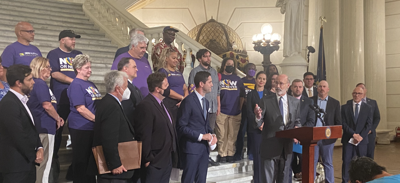Pennsylvania Gov. Tom Wolf joined state lawmakers and senior care advocacy groups on Monday to celebrate roughly $515 million allocated for long-term care and nursing facilities as part of the state budget he signed into law last week.
Wolf, a Democrat who leaves office in January 2023, touted the 2022-22 spending plan’s $250 million for long-term care — including $131 million for nursing facilities using some remaining federal relief funds — as a “new chapter” for long-term care in Pennsylvania.
“This funding will help stabilize the direct care workforce and nursing facilities in Pennsylvania,” Wolf said Monday during a Capitol press conference with the Pennsylvania Health Care Association, SEIU Healthcare Pennsylvania, and LeadingAge PA. “It will help ensure that our direct care workers have the support they need in order to keep providing high-quality care to residents of those places.”
The recently passed budget also outlines a $35 per-day rate increase in the Medicaid reimbursement rates, effective in January, requiring that 70 percent of the funds are spent directly on resident care, staffing, and support. And in the first increase since 2006, the spending plan raised the state supplemental grant for personal care and home care residents by $200 a month.
“It is truly an investment that could save senior care in this state,” PHCA President and CEO Zach Shamberg said. “It is a long-term investment in long-term care. That means more than $500 million to our sector, including state and federal matches.”
Shamberg said that the funds will help long-term care facilities and senior care providers address staffing shortages and recruitment efforts — issues exacerbated by the COVID-19 pandemic. Garry Pezzano, LeadingAge PA president and CEO, said the budget represents “a path forward” to start “building back” care facilities with increased staff and focusing on specialty services, such as memory care, that have been paused due to lack of resources.
“You can probably think of an instance in the last day or two where someone somewhere said: ‘We don’t have enough staff. Please be patient.’ And for most of the things we all do, we do understand that small inconvenience,” House Speaker Bryan Cutler, R-Lancaster, said. “But for anyone living in a nursing home or in a long-term care facility, waiting is not an option.”
Matt Yarnell, SEIU Healthcare Pennsylvania president and a former caregiver, said the COVID-19 pandemic made challenges within the senior care industry more apparent. He added that the support from the state budget “is a huge step in the right direction” to lift wages, provide adequate staffing, and offer training support.
“We’re going to be able to end the days of someone taking care of 20 residents on a day shift,” Yarnell said. “We’re going to be able to get from one to 10.”
He added: “It’s going to take more work like this. I think this is what government should do, what it should be about. We should be in a position where we can get the key stakeholders to come together and figure out a path forward that is beneficial to everyone in the commonwealth.”








(0) comments
Welcome to the discussion.
Log In
Keep it Clean. Please avoid obscene, vulgar, lewd, racist or sexually-oriented language.
PLEASE TURN OFF YOUR CAPS LOCK.
Don't Threaten. Threats of harming another person will not be tolerated.
Be Truthful. Don't knowingly lie about anyone or anything.
Be Nice. No racism, sexism or any sort of -ism that is degrading to another person.
Be Proactive. Use the 'Report' link on each comment to let us know of abusive posts.
Share with Us. We'd love to hear eyewitness accounts, the history behind an article.